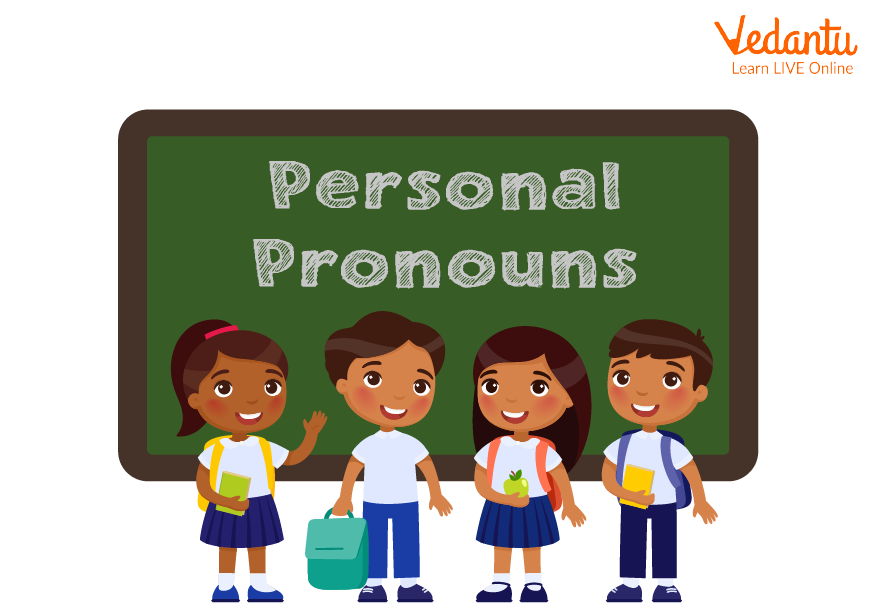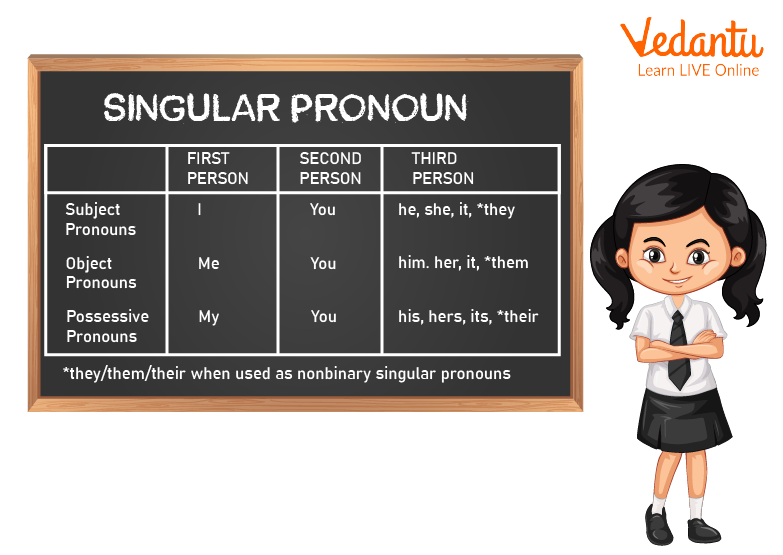Free PDF: Personal Pronouns Notes & Practice for Class 4 English (2025-26)
FAQs on Personal Pronouns Explained for CBSE Class 4 English Grammar (2025-26)
1. What is a personal pronoun as per the CBSE Class 4 syllabus, and why is it considered important for exams?
A personal pronoun is a word used to replace a noun that refers to a person or thing. It is considered an important topic for exams because it helps avoid repetition and makes sentences clearer. For example, instead of saying, "Rahul is my friend. Rahul plays cricket," you would use a pronoun: "Rahul is my friend. He plays cricket." Correct usage of pronouns is often tested in fill-in-the-blanks and sentence correction questions.
2. What are the three 'persons' in personal pronouns that are important for the Class 4 exam?
For the Class 4 English exam, it is important to know the three main groups, or 'persons', of personal pronouns. Questions often require you to identify or use the correct one:
- First-person: Refers to the person speaking (e.g., I, we, me, us).
- Second-person: Refers to the person being spoken to (e.g., you, yours).
- Third-person: Refers to the person or thing being spoken about (e.g., he, she, it, they, him, her, them).
3. How do you identify the correct personal pronoun (subject vs. object) to use in a sentence?
This is a very common type of question in exams. To choose the correct pronoun, you must check its role in the sentence:
- Use a subject pronoun (like I, he, she, we, they) when the pronoun is the one doing the action. For example: "She read the book."
- Use an object pronoun (like me, him, her, us, them) when the pronoun is the one receiving the action. For example: "The book was given to her."
4. In an exam, how would you identify the personal pronouns in this sentence: "They asked me to give the gift to him"?
To answer this type of identification question correctly, you should look for words that are replacing the names of people. In the sentence, "They asked me to give the gift to him," the personal pronouns are:
- They: A third-person subject pronoun.
- me: A first-person object pronoun.
- him: A third-person object pronoun.
5. Why is it so important to use the correct personal pronoun in a sentence?
Using the correct personal pronoun is crucial for clear communication. If you use the wrong pronoun, the meaning of your sentence can become confusing or incorrect. For instance, saying "He is my mother" is grammatically wrong and confuses the listener. Using the right pronoun ensures your writing is accurate and easy for the reader to understand, which is essential for scoring well in exams.
6. What is the main difference between a personal pronoun and a noun that a Class 4 student should know?
This is a key concept for your exams. A noun is the specific name of a person, place, or thing (e.g., 'Sita', 'garden', 'toy'). A personal pronoun is a shorter, general word that takes the place of that noun (e.g., 'she', 'it'). We use pronouns mainly to avoid repeating the same noun, which makes our sentences flow better. For example, 'Sita has a toy. She plays with it.'
7. How can changing a single personal pronoun from singular to plural affect the meaning of a sentence?
Changing a pronoun from singular (referring to one) to plural (referring to more than one) completely alters the meaning of a sentence. This is an important detail tested in exams. For example:
- "She is playing in the park." This means only one girl is playing.
- "They are playing in the park." This means two or more people are playing.
This small change affects who or what you are talking about and can impact marks in sentence construction questions.
8. What are the most frequently asked question types on personal pronouns in the CBSE Class 4 English exam (2025-26)?
Based on the CBSE pattern for the 2025-26 session, students can expect the following important question formats on personal pronouns:
- Fill in the blanks: You will be given a sentence with a blank and must choose the correct personal pronoun.
- Identify the pronoun: You will be given a sentence and asked to circle or list the personal pronouns within it.
- Replace the noun: You will be asked to rewrite a sentence by replacing a highlighted noun with a suitable pronoun.
- Error correction: You might be given a sentence with an incorrect pronoun and asked to correct it.





















